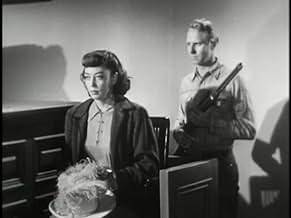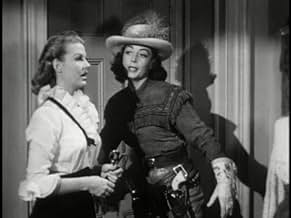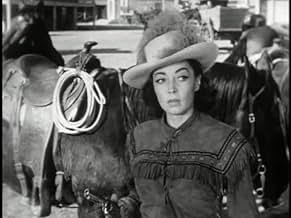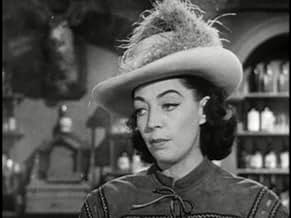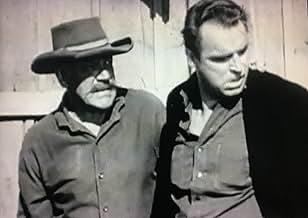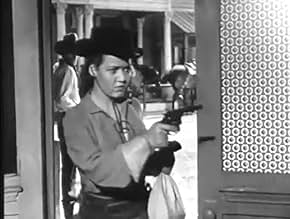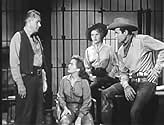Histoires du siècle dernier
Titre original : Stories of the Century
- Série télévisée
- 1954–1955
- Tous publics
- 30min
NOTE IMDb
7,0/10
220
MA NOTE
Ajouter une intrigue dans votre langueRailroad detective Matt Clark roams the west, tracking down outlaws and bandits who are preying on the railroad.Railroad detective Matt Clark roams the west, tracking down outlaws and bandits who are preying on the railroad.Railroad detective Matt Clark roams the west, tracking down outlaws and bandits who are preying on the railroad.
- Récompensé par 1 Primetime Emmy
- 1 victoire au total
Parcourir les épisodes
Avis à la une
In spite of an awful and even misleading title, this adventure series disguised as a detective show does provide some interesting history of the latter part of the nineteenth century. The narration works well, though maybe not in the voice of its star, Jim Davis. The editing, mixing in stock footage from Republic Pictures, is pretty good, and this show provides more action sequences of stampedes (horse and cattle) and stagecoach and wagon disasters than any western I know.
The stories are pretty good, examining the rampages and ends of some of the most notorious outlaws in western history (all supposedly based on true facts). The sets are very good--though as with much of early TV in the mid-1950s, you can see the abrupt change from location shooting to the studio set. And continuity problems are not uncommon.
The acting is okay, especially from some of the guest stars, many of whom were just starting out in television.
Overall, it works, and I wish they had continued--but, as another reviewer pointed out, I guess they ran out of true-to-life bad guys whose stories they could tell. I rated the series a 9 because it's better than an 8. And the location landscape shots (lots of well-filmed chance sequences) are wonderful.
The stories are pretty good, examining the rampages and ends of some of the most notorious outlaws in western history (all supposedly based on true facts). The sets are very good--though as with much of early TV in the mid-1950s, you can see the abrupt change from location shooting to the studio set. And continuity problems are not uncommon.
The acting is okay, especially from some of the guest stars, many of whom were just starting out in television.
Overall, it works, and I wish they had continued--but, as another reviewer pointed out, I guess they ran out of true-to-life bad guys whose stories they could tell. I rated the series a 9 because it's better than an 8. And the location landscape shots (lots of well-filmed chance sequences) are wonderful.
This is an interesting series that takes real life people (Jesse James, John Wesley Hardin, etc)...and dramatizes part of their real story with a continuing series character taking part in that story. Railroad Detective "Matt Clark" -- takes a role in tracking down famous outlaws from the Old West in stories that are at least partly based on the true accounts. In that sense, it's almost an anthology series, and as someone else pointed out, this odd structure poses some timeline conflicts with the real events, but it's a fun series with plenty of action to satisfy a western-hungry 1950's audience -- and it still holds up pretty well 55 years later. Clark cuts a powerful figure in his western gear as he goes up against some of history's baddest baddies. And his girl-sidekick Frankie is quite a dish. If you're a western fan, be sure to check it out if you have a chance.
"Stories of the Century" was a half hour series and appeared in first run syndication during the '54-'55 television season. It was also the first western TV series to win an Emmy award. Starring veteran western actor Jim Davis as railroad detective Matt Clark, the series set Clark and his fellow railroad detective partners (Mary Castle as Frankie Adams for the first half of the season and Kristine Miller as "Jonesy" during the second half)against historic western outlaws of various periods ranging from the mid-1860's to the early 1900's. The series was very satisfying, easy to watch, and fairly realistic due mainly to the easygoing charm of Jim Davis in the lead role. He seemed like an actual western character. One other note. When Matt Clark would arrive in town after a long ride he actually looked like he had been on a long horse ride as he would be covered in dust.
A very good early adult western.
A very good early adult western.
'Big' Jim Davis, as Matt Clark, Railroad Detective, traveled west each week to aid in the capture of one of history's notable badmen(or women). At times, Clark's appearance at the scene seems somewhat contrived, as in just "happening" to be in town when Ford shoots Jesse James. The stories do have some limited educational value, as each one sticks to the basic facts, although production values for the series were decidedly low budget. One thing I could never figure out...one week Clark would chase Quantrill in 1863, the next Tom Horn in 1903...30 years apart...yet he never aged!
Stories Of The Century casts Jim Davis and Mary Castle as a pair of railroad detectives who seem to have aided in the apprehension or demise of every outlaw in the west. The years of their operations range all the way from the Civil War to the Theodore Roosevelt era and yet they aged not a day. This is in the tradition of the B western and it was the soon to be extinct Republic Pictures who produced this for television. William Witney, veteran contract director for Republic seems to have done most of the episodes.
I guess the fact that they ran out of name bandits was the cause of Stories Of The Century met its demise. A studio like Republic that had small scale operations should have been the first ones into television. Probably Herbert J. Yates regretted he didn't move earlier into the small screen.
The episodes I saw of the show had not one hint of any romance between Davis and Castle. They were all business every week and while Castle's considerable beauty and charm caused the fall of many an outlaw, she and Davis never got personal. In fact they were as impersonal as any Dragnet Show that Jack Webb did. Davis and Castle dealt only in facts.
Stories Of The Century with all the disclaimers about the impossibility of Davis and Castle being Zelig like at the scene of every outlaw's fall was not a bad series. It was a beginning of the TV trend to more adult westerns.
I guess the fact that they ran out of name bandits was the cause of Stories Of The Century met its demise. A studio like Republic that had small scale operations should have been the first ones into television. Probably Herbert J. Yates regretted he didn't move earlier into the small screen.
The episodes I saw of the show had not one hint of any romance between Davis and Castle. They were all business every week and while Castle's considerable beauty and charm caused the fall of many an outlaw, she and Davis never got personal. In fact they were as impersonal as any Dragnet Show that Jack Webb did. Davis and Castle dealt only in facts.
Stories Of The Century with all the disclaimers about the impossibility of Davis and Castle being Zelig like at the scene of every outlaw's fall was not a bad series. It was a beginning of the TV trend to more adult westerns.
Le saviez-vous
- AnecdotesMuch of the action consisted of footage lifted from various westerns produced by Republic Pictures over the years. Republic produced this series through its subsidiary, Hollywood Television Service.
- Citations
Matt Clark: I don't care how right a man is. As soon as he picks up a gun, he's wrong from the start!
- ConnexionsReferences Face au châtiment (1949)
Meilleurs choix
Connectez-vous pour évaluer et suivre la liste de favoris afin de recevoir des recommandations personnalisées
- How many seasons does Stories of the Century have?Alimenté par Alexa
Détails
- Date de sortie
- Pays d’origine
- Langue
- Aussi connu sous le nom de
- Stories of the Century
- Lieux de tournage
- Sociétés de production
- Voir plus de crédits d'entreprise sur IMDbPro
- Durée
- 30min
- Couleur
- Rapport de forme
- 1.33 : 1
Contribuer à cette page
Suggérer une modification ou ajouter du contenu manquant


